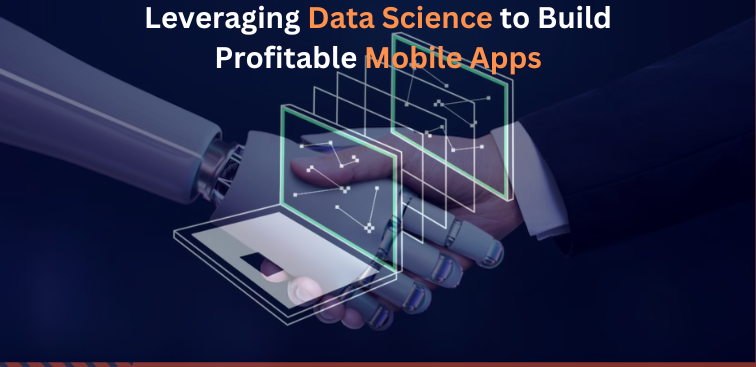A Guide to Harnessing Data Science for Mobile App Profitability
- By Nathan Smith
- 26-01-2024
- Mobile App Development

It's pretty amazing what today's data science techniques allow us to do. You can take all the information users generate through their mobile activity and turn it into actionable intelligence. Those insights can help build apps with features and functions that map to each user's unique behavior.
In short, data science unlocks a deeper understanding of customers. Based on this information, mobile app developers can incorporate new and improved functionalities into their solutions. The end result is an incredibly intuitive app experience for users and a profitable solution for the app owners/businesses.
Read on to understand in detail how data science can be used when building mobile applications for assured growth in business revenue and end-user satisfaction.
Role of data science in mobile app development
-
To understand user needs
Brands like Spotify and Amazon lead the way in leveraging data to deliver hyper-personalized experiences. Their secret? Data science.
By harnessing user analytics, developers can decode exactly how each person interacts with an app. The insights are incredible. You can see which features draw users in, which ones hold their attention, time spent on different sections, and how frequently they engage with the multiple layers of the app.
Understanding these patterns helps developers identify which aspects of the app are popular among users and which areas may need improvement. Additionally, this profound understanding of user needs lets mobile app developers tailor the app's features and functionalities to meet and exceed user expectations.
-
Crafting the right marketing strategies
Utilizing data science in mobile app development helps developers identify effective marketing channels, user acquisition sources, and engagement touchpoints. This information is crucial for building target marketing strategies that resonate with the app's target audience, ultimately driving user retention.
Using data analytics, developers and marketers can gain actionable insights for curating user acquisition and retention strategies. It helps in providing ideas about which features to focus on during mobile app development so as to prompt a massive increment in the app's traffic.
Analyzing user data helps identify the demographics of the app's user base. This information allows developers to tailor marketing campaigns to specific demographic segments, ensuring that promotional efforts are relevant and appealing to the target audience. This targeted approach increases the likelihood of attracting users who find value in the app.
-
Effective advertisements
Data science enables the creation of targeted advertising campaigns, ensuring that ads are delivered to specific audience segments most likely to be interested in the app. It enhances the chances of user engagement and conversion, resulting in fostering revenue.
Advertisers can analyze which types of ads like banners, interstitials (short pop-up ads), and videos perform best and where their placement is most effective within the app. It helps in optimizing ad placement for maximum visibility and impact.
-
Fraud detection
Data science can play a vital role in fraud detection. By leveraging machine learning algorithms and advanced data analytics techniques, app developers can analyze vast datasets, generated from user interactions, transactions, and device information.
It helps them find the anomalies and patterns indicative of fraudulent behavior, allowing for the creation of effective fraud detection models. These models can adapt and evolve as they learn from new data, staying ahead of emerging fraudulent techniques.
Identifying and preventing fraudulent activities by leveraging data science can enhance the overall security and trustworthiness of mobile applications. It leads to a secure digital environment for users and helps maintain the reputation of the company that serves its customers through its mobile app.
Moreover, integrating fraud detection features and implementing secure coding practices during mobile app development are equally vital to developing secure apps. You can expect such proficiency only from an expert app developer. It might be costlier to hire such a resource in house, though, and therefore organizations dealing with budget constraints generally opt for mobile app development services from a reputed company to ensure that their app development is in capable hands.
-
Uncover hidden issues
Through the analysis of app performance metrics, and error logs, data scientists can identify performance degradation patterns that may lead to app failures. This allows developers to address issues proactively before they escalate, ensuring a more stable and reliable app. It will minimize app disruptions, leading to a better user experience.
Challenges in utilizing data science practices during mobile app development
Implementing data science to build better mobile apps is a transformative concept, but it comes with its set of challenges. That's why partnering with experts is usually suggested. Experienced mobile app development companies have specialized professionals who know how to extract actionable intelligence to build highly engaging, personalized app experiences.
Having said that, here are some common challenges that you can face on this path.
-
Data quality and availability
The quality of insights derived from data analysis heavily relies on the quality and availability of data. Inconsistent or incomplete data can lead to inaccurate analysis and predictions. To address such issues, it is essential to implement robust data collection strategies, ensure data accuracy through validation processes, and work towards improving data quality over time.
-
Integration with existing systems
Integrating data science capabilities with existing mobile app infrastructure can be challenging. Legacy systems may not be designed to handle the advanced analytics required for effective data science. To mitigate this, it is vital to plan for a phased integration, update infrastructure where necessary, and leverage APIs for smoother integration with existing systems.
-
Talent shortage
Implementing data science techniques requires proficiency in programming languages, statistical analysis, machine learning, and domain-specific knowledge. Mobile app development projects often require a combination of technical skills and statistical expertise.
There may be a shortage of individuals with this diverse skill set, which can hinder the effective implementation of data science in developing mobile apps. Therefore, to save time in finding the right app development partner with relevant skills, you can connect with a Mobile app development company.
By proactively tackling these issues, organizations can harness the full potential of data science in building successful and profitable mobile applications.
Real-life examples of data science usage in mobile application development
Data science usage in mobile application development showcases the diverse ways in which data-driven insights can be harnessed to enhance user experiences, optimize performance, and drive business success. Here are a few noteworthy examples:
-
Health and fitness apps
To analyze user health and fitness data, mobile applications generally use data science techniques. Machine learning algorithms provide personalized insights, suggest workout routines, and also offer dietary recommendations based on individual health goals and historical data.
-
Ride-hailing apps
Uber employs data science to implement dynamic pricing based on factors like demand, traffic, and weather conditions. This data-driven approach optimizes pricing in real-time, ensuring fair fares during peak demand and incentivizing drivers to meet user needs, contributing to enhanced user trust and driver engagement.
-
Weather and forecasting applications
Weather apps use data science to process vast amounts of meteorological data. Machine learning models analyze historical weather patterns, satellite imagery, and real-time data to provide accurate weather forecasts for user locations.
-
Social media applications
Social media platforms like Facebook and Instagram use data science techniques to curate user feeds. Algorithms analyze user interactions, content preferences, and engagement patterns to prioritize content that users are likely to find most relevant and interesting. Facebook uses data science to analyze user interactions, content preferences, and social connections. This results in the platform delivering personalized content feeds, targeted ads, and friend suggestions which enhances user engagement on the platform.
-
Navigation apps
Apps like Google Maps use data science to analyze real-time traffic data, historical traffic patterns, and user behavior to provide accurate and efficient navigation routes. This usage of predictive analytics by navigational apps helps in estimating and minimizing travel times, suggesting optimal routes, and providing a smoother navigation experience.
Future of data science in mobile app development
Shortly, data science is poised to bring transformative changes in mobile app development, shaping more personalized, and efficient applications. Several key trends are expected to influence the evolution of data science in this domain:
-
Mobile edge computing integration
Edge computing is set to become more prominent, facilitating the processing and analysis of data in closer proximity to the user’s device. This approach will reduce latency, enhance real-time capabilities, and optimize the performance of mobile applications.
-
Enhanced security with blockchain
Blockchain is anticipated to play a crucial role in fortifying data security in mobile apps. Its decentralized and transparent nature can safeguard user data, transactions, and identity, instilling greater trust among app users concerned about privacy and security.
-
5G-powered innovations
The broad acceptance of 5G technology will open up fresh opportunities for data-intensive mobile applications. With faster data speeds, the collection and transmission of large datasets are set to become quicker and more efficient. This will facilitate real-time data analytics, allowing mobile apps to process and respond to user interactions within shorter timeframes.
-
Augmented reality (AR) and virtual reality (VR) integration
The advancements in AR and VR will give rise to the development of engaging and interactive mobile experiences. Data science will play a pivotal role in analyzing user interactions within these environments, enabling developers to enhance AR and VR applications and provide users with more compelling content.
-
Predictive analytics for enhanced user engagement
Predictive analytics will continue to evolve, enabling developers to forecast user behavior more accurately. Mobile apps will leverage this capability to provide targeted content, optimize user interfaces, and enhance overall user engagement, contributing to increased retention rates and profitability.
Conclusion
The integration of data science in mobile app development is more than a trend. It is a strategic imperative for achieving sustained success and profitability. Moving ahead, by embracing data-driven decision-making, developers can create apps that cater precisely to user needs. This will ensure long-term success in the ever-evolving digital ecosystem. So, either prepare your team or hire mobile app developers from a third-party vendor, and get on with this new endeavor.
Frequently Asked Questions (FAQs)
1. What types of mobile apps benefit most from data science?
Applications generating and collecting rich user data can benefit the most from data science. Here are some specific examples -
Content-based applications
- eCommerce and marketplace apps
- Finance and investment apps
- Health and fitness apps
- Gaming apps
2. How can I validate my app idea using data science techniques before development?
Data science can be used for market analysis and user research to validate your mobile app idea. Analyze existing data to understand user needs, preferences, and competitor offerings in your target market. Additionally, you can conduct surveys or A/B testing to gather real-time user feedback, helping validate and refine your app idea based on data-driven insights.
3. How can I use data science to optimize in-app monetization strategies?
You can analyze user behavior, purchasing patterns, and engagement metrics to identify opportunities for targeted advertisements, personalized offers, and subscription models.
4. How can I ensure data security and privacy in my app?
Ensuring data security and privacy involves implementing robust measures. Use encryption techniques to protect sensitive user data. Adhere to data protection regulations and adopt privacy-preserving methodologies, such as anonymization and aggregation. Moreover, regular security audits, access controls, and user education on data handling practices contribute to maintaining a secure and privacy-conscious mobile app.
5. How can I measure the success of my data science initiatives in my mobile app?
Success in data science initiatives can be measured through key performance indicators (KPIs) like user engagement, conversion rates, and customer retention. You can also conduct A/B testing to compare the performance of data-driven features or strategies. Moreover, feedback loops, user surveys, and user satisfaction scores provide qualitative insights. However, to ensure continued success, it is essential to regularly review and adapt data science models based on evolving business goals and user needs.


.jpg)
.jpg)
.jpg)
